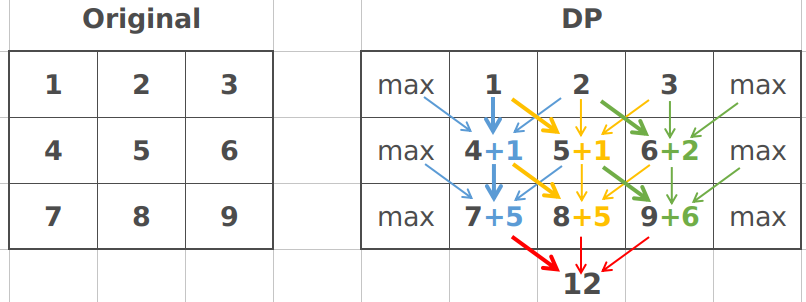题目地址:https://leetcode.com/problems/minimum-falling-path-sum/description/
题目描述
Given a square array of integers A, we want the minimum sum of a falling path through A.
Afalling path starts at any element in the first row, and chooses one element from each row. The next row's choice must be in a column that is different from the previous row's column by at most one.
Example 1:
Input: [[1,2,3],[4,5,6],[7,8,9]]
Output: 12
Explanation:
The possible falling paths are:
- [1,4,7], [1,4,8], [1,5,7], [1,5,8], [1,5,9]
- [2,4,7], [2,4,8], [2,5,7], [2,5,8], [2,5,9], [2,6,8], [2,6,9]
- [3,5,7], [3,5,8], [3,5,9], [3,6,8], [3,6,9]
Thefalling path with the smallest sum is [1,4,7], so the answer is 12.
Note:
1、1<=A.length==A[0].length<=100;
2、-100<=A[i][j]<=100;
题目大意
从最上面一行开始向下走,每次移动的时候最多只可以移动一列。也就是说每次必须向下走一行,列可以不变、也可以向左右移动一列。求到达最后一行的时候,最短的路径长度。
解题方法
动态规划
刚做过类似的题目,但是我还是没有做出来。。这个题和799香槟塔很像,都是二维空间求最大、最小的路径问题。

如果看上面这个图就明白了,数组中每个位置都要从上一层获得三个相邻列的最小值,换句话说,每个位置都可以给下面三个相邻列传递最小值。那么,其实就是一个动态规划嘛,到每个位置的最短路径,就是当前数值加上到达上面那层的三个相邻列的最小值。
所以这个题代码其实很简单,只需要设置好边界,然后我们每次查找上面的三个最小值加上当前的位置,得到的就是到达当前位置的最小路径。
做DP的时候,不要怕设置边界条件。我以前总想着用各种方法想着让dp数组和原来的数组一样大,这个思想是错误的!因为我们记忆化搜索的时候实际上有很多边界条件的,其实是可以转化成dp的边界条件,或者说是初始条件。提前给dp数组设定各种边界条件,能简化很多状态转移代码~这个题就很好的说明了这点!
时间复杂度是O(MN),空间复杂度是O(MN)。
class Solution(object):
def minFallingPathSum(self, A):
"""
:type A: List[List[int]]
:rtype: int
"""
M, N = len(A), len(A[0])
dp = [[0] * (N + 2) for _ in range(M)]
for i in range(M):
dp[i][0] = dp[i][-1] = float('inf')
for j in range(1, N + 1):
dp[i][j] = A[i][j - 1]
for i in range(1, M):
for j in range(1, N + 1):
dp[i][j] = A[i][j - 1] + min(dp[i - 1][j - 1], dp[i - 1][j], dp[i - 1][j + 1])
return min(dp[-1])
1 2 3 4 5 6 7 8 9 10 11 12 13 14 15 16
相似题目
799. Champagne Toweropen in new window【面试现场】如何编程获得最多的年终红包奖?open in new window
参考资料
https://leetcode.com/problems/minimum-falling-path-sum/discuss/186689/Java-DP-solution-with-graph-illustrated-explanations
DDKK.COM 弟弟快看-教程,程序员编程资料站,版权归原作者所有
本文经作者:负雪明烛 授权发布,任何组织或个人未经作者授权不得转发